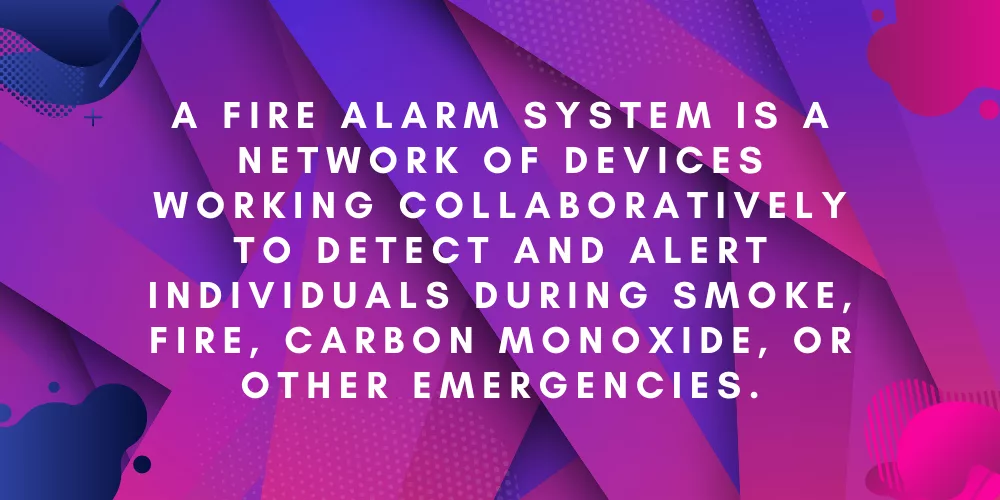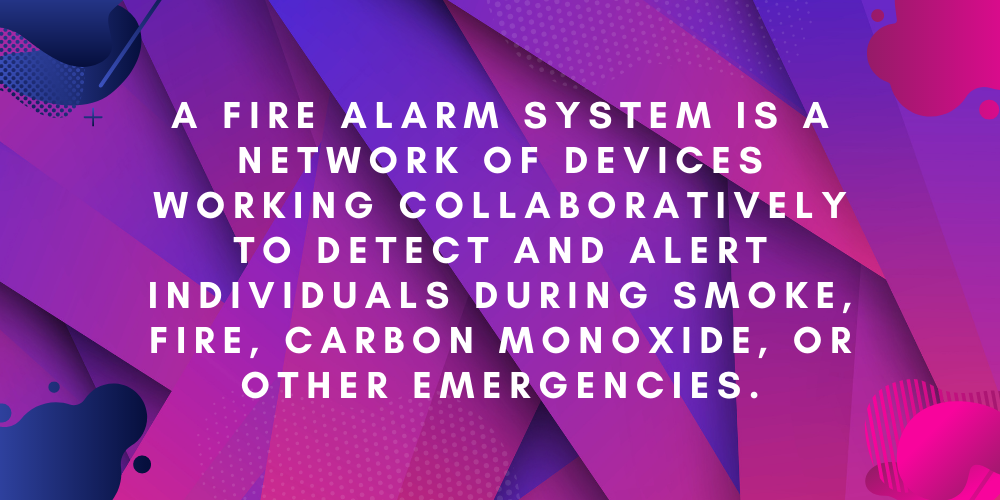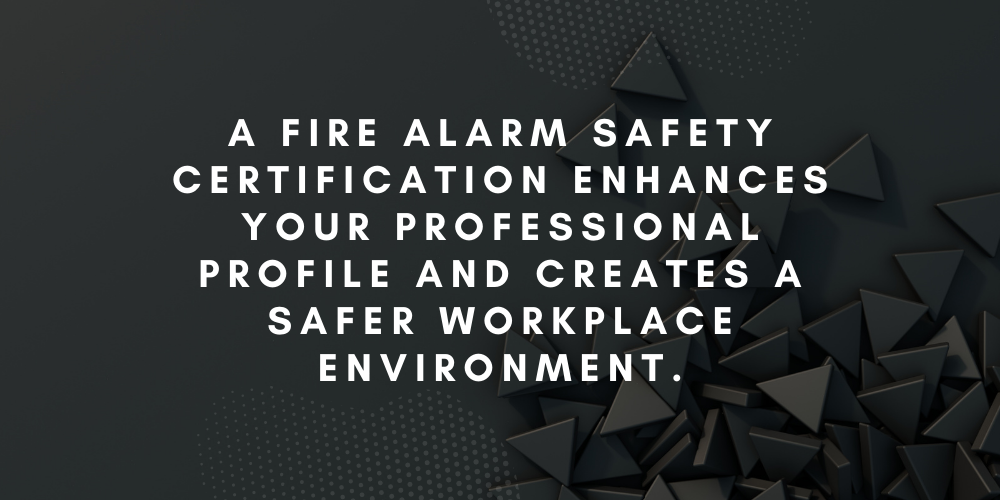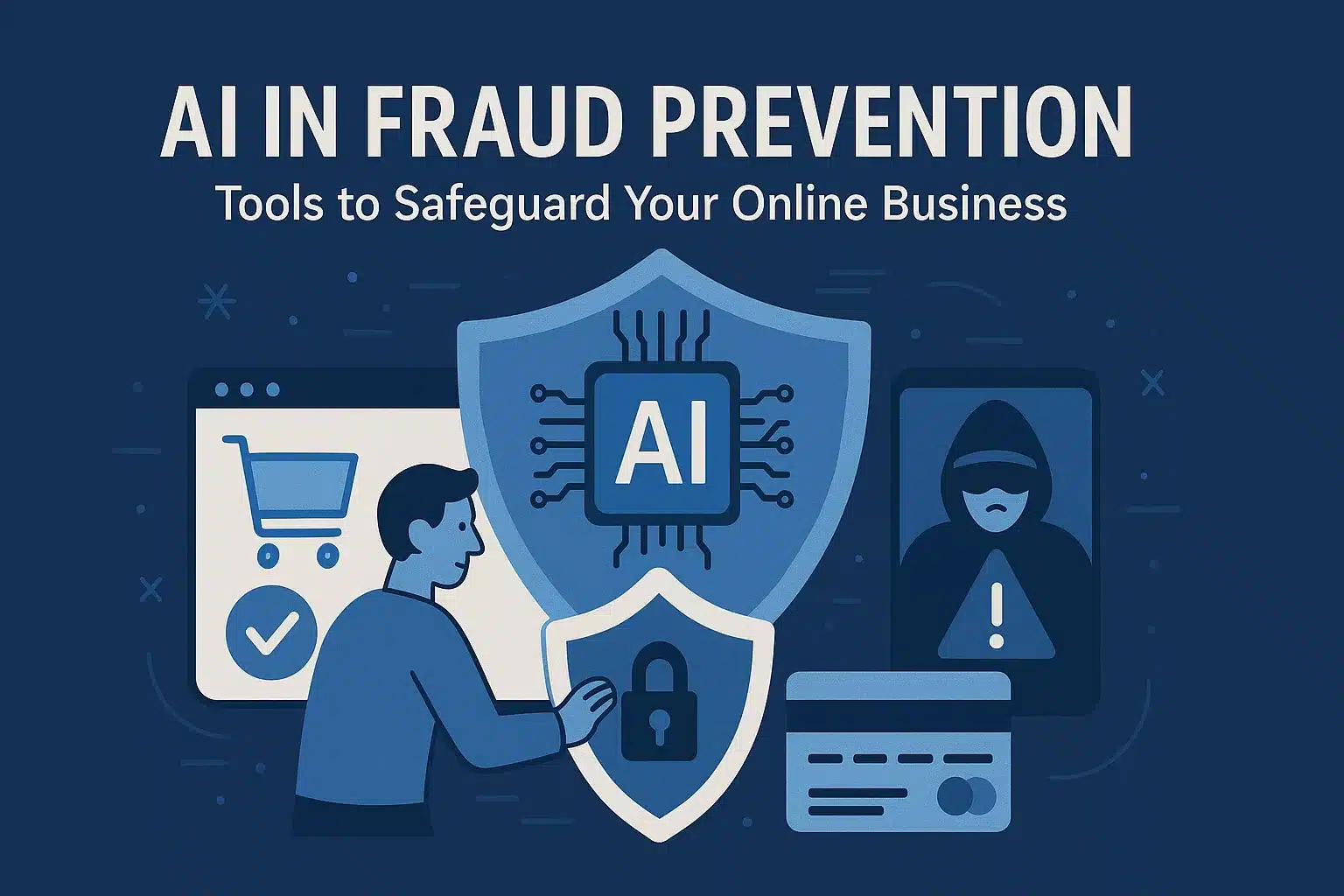Fire Alarm System: How Does It Work, Types, And Fire Alarm Safety Certification
Fire Alarm Safety Certifications: In our professional lives, safety holds paramount importance. A comprehensive fire alarm system is an integral aspect of workplace safety. These systems serve as an advanced warning mechanism, potentially saving lives and minimizing property damage.
In 2023, there are four standout Fire Alarm Safety Certifications from Coggno that anyone involved in this field should consider.
What Is A Fire Alarm System?
Fire Alarm System – A fire alarm system is a network of devices working collaboratively to detect and alert individuals during smoke, fire, carbon monoxide, or other emergencies.
Must Read: Top 7 Fire Safety Courses Online
How Does A Fire Alarm Safety System Work?
A fire alarm system operates in stages designed to rapidly detect, alert, and respond to potential fires. Here’s a simplified breakdown of the process:
5 Tips How Fire Alarm System Works
1. Detection
It is the first step in the fire alarm safety system’s operation. The system utilizes a variety of detectors to identify signs of a potential fire, such as increased heat, smoke, or even specific gases like carbon monoxide.
These detectors are installed in strategic locations throughout a building to ensure comprehensive coverage.
2. Signal Transmission
When a detector identifies a potential fire, it sends a signal to the control panel of the fire alarm system. This control panel is the ‘brain’ of the system, responsible for processing incoming signals and activating the alarm.
Save Thousands Of Dollars With Coggno Prime Subscription
3. Alarm Activation
Once the control panel receives and validates the signal, it triggers the alarm.
It involves both visual and audio warnings. Strobe lights flash to provide a visual cue, particularly useful in noisy environments or for those with hearing impairment. Simultaneously, an audible alarm sounds to alert occupants of the building.
4. Notification of Emergency Services
In more advanced fire alarm systems, the control panel can automatically notify the local fire department or a third-party monitoring service once the alarm is triggered. It ensures a quick response to the situation.
5. Manual Call Points
In addition to automatic detection, most fire alarm systems include manual call points or pull stations. These allow individuals to manually trigger the alarm if they notice signs of a fire before the system does.
Understanding the mechanics of a fire alarm safety system underscores the importance of regular maintenance and inspection. It’s essential to ensure that all elements, from detectors to the control panel and alarms, function correctly.
And that’s where professional Fire Alarm Safety Certifications come in, providing the necessary knowledge and skills to uphold these critical safety systems.
Check out – Online Safety Training Courses
Different Types Of Fire Alarm Systems
Fire alarm systems are not a one-size-fits-all solution. They come in various types, each with its own unique advantages.
Conventional Fire Alarm Systems
A longstanding choice, this system divides a building into zones, with detectors and call points hardwired back to the control panel.
Addressable Fire Alarm Systems
In these systems, each device carries a unique address, pinpointing the exact location of a fire outbreak.
Wireless Fire Alarm Systems
This system circumvents the need for physical wires, communicating with the control panel wirelessly. It is ideal for buildings where wiring poses a challenge.
Hybrid Fire Alarm Systems
It is a versatile system combining features of both wired and wireless systems.
Fire Alarm System Courses From Coggno
For 2023, here are the top four Fire Alarm Safety Certifications:
- Fort Belknap Fire Safety Training 2022 Course
- CAN/ULC-S536-04 – The Standard for Inspection and Testing of Fire Alarm Systems
- CAN/ULC-S537 – The Canadian Standard for Verification of Fire Alarm Systems
- Fire Alarm Systems – UL Listing, Certification, Acceptance, and Testing/Maintenance
Fort Belknap Fire Safety Training Course
The Fort Belknap Fire Safety Training 2024 is a tailor-made course. It is geared towards educating Healthcare Providers (HCPs) about the essentials of fire safety and the appropriate response during fire alarms.
The course is designed to be concise and impactful, with a duration of only 30 minutes. It is conducted entirely in English, ensuring clear and effective communication.
Participants will also receive a certificate upon completion as a testament to their acquired knowledge in fire safety. The course offers a bookmark feature for easy navigation and is primarily intended for employees in healthcare settings.
The course also employs data and insights from authoritative government bodies such as OSHA, OCR, FDA, CDC, NIAID, ATSDR, HHS, and WHO.
Furthermore, the providers are committed to delivering a quality experience. If participants are unsatisfied with the course, a full refund is guaranteed within 30 days of purchase.
CAN/ULC-S536-04 – The Standard for Inspection and Testing of Fire Alarm Systems
In Canada, fire alarm systems must be installed, verified, and inspected under CAN/ULC-S524, CAN/ULC-S537, and CAN/ULC-S536-04, respectively.
The procedures specified in CAN/ULC-S536 ensure that both the fire alarm system and its components function correctly. It facilitates an early warning system in case of fire or other emergencies and ensures the safe evacuation of building occupants.
The course is divided into three modules, each detailing the inspection and testing procedures per the CAN/ULC-S536 standard.
The first module provides the following:
- An overview of the fire alarm system’s components, including the functions of the control unit and the inspection process;
- Detailed system tests and inspection records are used during the inspection process.
The second module covers the following:
- The inspection and testing of large-scale power supplies;
- Primary and emergency power supplies;
- Annunciators;
- Sequential displays;
- Remote trouble signal units;
- Printers and field devices
The final module elaborates on the inspection and testing procedures for various field devices.
Ideally, this course suits those with prior knowledge and experience with fire alarm systems, their components, and associated industry terms.
On completing this two-hour course, participants will have a solid understanding of a fire alarm system’s testing and inspection procedures, as outlined in CAN/ULC S536.
The course is in English, and a certificate is provided upon completion. It also features a bookmark option for easy navigation.
The course requires a compatible system for smooth operation. These include
- Microsoft Internet Explorer 10 or 11+;
- Microsoft Edge;
- Google Chrome (latest version);
- iPad iOS (latest version – tablet only);
- Mac OS 10.10 or 10.11 (PC only);
- Apple Safari 8 or 9;
- Android Google Chrome (latest version)
Course playback is not suitable for mobile phones. For optimal playback, learners should close all other browser windows when viewing the course.
CAN/ULC-S537 – The Canadian Standard for Verification of Fire Alarm Systems
This training course comprises three modules, each focusing on key verification and testing procedures as defined in the standard.
The first module covers the following:
- A comprehensive overview of fire alarm systems;
- The verification process;
- Relevant documentation;
- Verification procedures for field devices, related circuits, data communication links, control units, transponders, and voice communication systems.
The second module continues with the verification processes for the following:
- Large-scale network systems;
- Power supplies;
- Emergency power supplies;
- Annunciators;
- Sequential displays;
- Remote trouble signal units;
- Printers;
- Ancillary device circuits
The final module wraps up the course by examining the verification procedures for various field devices, including those requiring minimum sound pressure.
This two-hour course instills familiarity and practical experience with fire alarm systems, their components, and industry-specific terminology.
Upon completing this course, participants will be able to understand the requirements for verifying a fire alarm system as outlined in CAN/ULC-S537.
They will be able to:
- Describe the testing procedures that confirm the operability of the fire alarm system and all of its components;
- Identify verification report forms used to facilitate the verification process;
- Understand the verification procedures for system modifications.
The course is in English and provides a certificate upon completion. It also includes a bookmark feature for easy navigation.
For optimal operation, the course requires specific system compatibilities:
- Microsoft Internet Explorer 10 or higher;
- Microsoft Edge;
- Google Chrome (latest version);
- iPad iOS (latest version – tablet only);
- Mac OS 10.10 or 10.11 (PC only);
- Apple Safari 8 or 9;
- Android Google Chrome (latest version)
Please note mobile phones are not suitable for course playback. For the best learning experience, it’s advised to close all other browser windows when viewing the course.
Fire Alarm Systems – UL Listing, Certification, Acceptance, and Testing/Maintenance
The “Fire Alarm Systems” is a comprehensive three-part eLearning training series that delves into the various facets of alarm certification. It focuses on the value of participating in the UL alarm certification program.
The first module covers an array of topics, including:
- An overview of fire alarm systems;
- The distinctions between Protected Premises Alarm Systems and Supervising Station Systems;
- The fundamental components of a fire alarm system;
- UL standards product certifications;
- The UL Listing Process.
Participants get a thorough overview of the NFPA 72 regulation in the second module. This module covers topics such as:
- Necessary documentation;
- Required personnel qualifications;
- Power supplies;
- Detection and signaling systems;
- Responses, circuits and pathways
The third and final module focuses on the various types of inspection and testing, along with their schedules and methods. It provides insight into the following:
- Special considerations;
- Initiation devices;
- Notification appliances;
- Emergency control function interfaces.
This three-hour fire alarm system training is in English and provides a fire alarm certification online in a digital format upon completion. For added convenience, a bookmark feature has been included. The primary audience of this training is employees in the field of fire safety.
Must Read – 12 Benefits Of Health And Safety Training
The fire alarm system course requires specific system requirements for optimal operation:
- Microsoft Internet Explorer 10 or higher, like 11+;
- Microsoft Edge;
- Google Chrome (latest version);
- iPad iOS (latest version – tablet only);
- Mac OS 10.10 or 10.11 (PC only);
- Apple Safari 8 or 9, and Android Google Chrome (latest version)
It is worth noting that mobile phones are not suitable for course playback, and it is advised to close all other browser windows when viewing the course for the best learning experience.
What Are The Different Types Of Fire Alarm Detectors?
Fire alarm systems employ various detectors to identify signs of a potential fire.
Smoke Detectors
Smoke detectors identify smoke particles in the environment, indicating a possible fire.
Heat Detectors
These devices detect sudden increases in temperature, another potential sign of a fire.
Carbon Monoxide Detectors
Carbon monoxide, an odorless and colorless gas, can be a fire’s byproduct. These detectors identify its presence.
Multi-Sensor Detectors
These devices can detect multiple fire conditions, providing a comprehensive safety solution.
Check out – Safety And You For Construction: Encouraging Safe Work Course
Why Is The Fire Alarm System Important In The Workplace?
Why should your workplace prioritize a high-quality fire alarm system? Here are five compelling reasons.
Life Safety
The primary objective of fire alarm systems is to protect lives by enabling a swift evacuation during an emergency.
Property Protection
By providing an early warning, fire alarm systems can mitigate property damage.
Legal Requirement
Many jurisdictions legally mandate the installation of certified fire alarm systems.
Insurance Compliance
Insurance providers often require businesses to install approved fire alarm systems to qualify for coverage.
Peace of Mind
A reliable fire alarm system ensures a safer work environment, providing peace of mind to all.
FAQs On Fire Alarm Safety Certification
Q. Can I obtain fire alarm certification online?
A. Yes, Coggno offers fire alarm certification online courses, allowing you to complete the training and exams remotely.
Q. What is included in fire alarm safety certification training?
A. Fire alarm safety certification training includes understanding fire alarm systems, installation procedures, maintenance, testing protocols, and regulatory compliance.
Q. Who needs to obtain a fire alarm certification online?
A. Fire alarm safety certification is required for fire safety professionals, electricians, building managers, and anyone responsible for installing and maintaining fire alarm systems.
Q. How often should fire alarm safety certification online be renewed?
A. It’s recommended to renew fire alarm safety certification online annually to keep skills current and stay updated on any new safety protocols.
Q. Are online fire alarm safety certification courses accredited?
A. Coggno’s fire alarm certification online courses are accredited by relevant industry bodies. But you can always verify the accreditation before enrolling.
Q. What are the technical requirements for taking an online fire alarm safety certification course?
A. You need a reliable internet connection, a computer or tablet, and sometimes specific software to access course materials and exams.
Q. Can I take an online fire alarm safety certification course at my own pace?
A. Coggno’s online fire alarm safety certification courses are self-paced. Our courses allow you to complete the coursework according to your schedule within a specified time frame.
Q: How can I prepare for the best fire alarm safety certification exam?
A: To prepare for the best fire alarm safety certification exam, such as NICET, you can use study guides, take preparatory courses, and gain hands-on experience in the field. Many training programs and practice exams are available online.
Q: How does having the best fire alarm safety certification benefit my career?
A: Having the best fire alarm safety certification, like NICET, enhances your professional credibility, increases job opportunities, and can lead to higher salary prospects due to the recognized expertise in fire alarm systems.
Q: What is a fire alarm system certification?
A: A fire alarm system certification verifies that a fire alarm system has been properly installed, tested, and maintained according to specific safety standards and regulations.
Q: How do I obtain a fire alarm system certification?
A: To obtain a fire alarm system certification, you need to have your system inspected by a certified professional, who will conduct a thorough test of the system and ensure it meets all regulatory requirements before issuing the certification.
Q: What components make up a fire alarm system?
A: A fire alarm system includes components such as smoke detectors, heat detectors, manual pull stations, control panels, notification devices (sirens, strobes), and communication interfaces.
Q: How often should a fire alarm system be inspected?
A: A fire alarm system should be inspected at least annually, though more frequent inspections, such as semi-annual or quarterly, may be recommended depending on the building’s use and local regulations.
Q: What are the legal requirements for installing a fire alarm system in a commercial building?
A: Legal requirements for installing a fire alarm system in a commercial building vary by jurisdiction but generally include adhering to national fire codes and local building regulations and ensuring systems are installed by certified professionals.
Q. Why are fire alarm safety certification courses important?
A. Fire alarm safety certification courses are important because they ensure that individuals understand the principles of fire detection and alarm systems. Proper training helps in the correct installation, maintenance, and operation of these systems, which are crucial for early fire detection and ensuring occupant safety.
Q. What certifications can be obtained from fire alarm safety courses?
A. Certifications from fire alarm safety courses can include NICET (National Institute for Certification in Engineering Technologies) certification in Fire Alarm Systems, NFPA (National Fire Protection Association) certification, and other industry-recognized credentials that validate a professional’s expertise in fire alarm safety.
Q. How often should fire alarm safety certifications be renewed?
A. Fire alarm safety certifications should be renewed every 2-3 years, depending on the certifying body’s requirements. Regular renewal ensures that professionals stay up-to-date with the latest technologies, standards, and best practices in fire alarm safety.
Bottom Line
A fire alarm certification online enhances your professional profile and creates a safer workplace environment. The fire alarm training courses provided by Coggno are invaluable in providing this specialized knowledge.
As we bring awareness and fire alarm training, we pave the way for safer workplaces. With Coggno, we take a proactive step towards this crucial safety goal.
Maximize Training, Minimize Costs With Coggno Prime





















